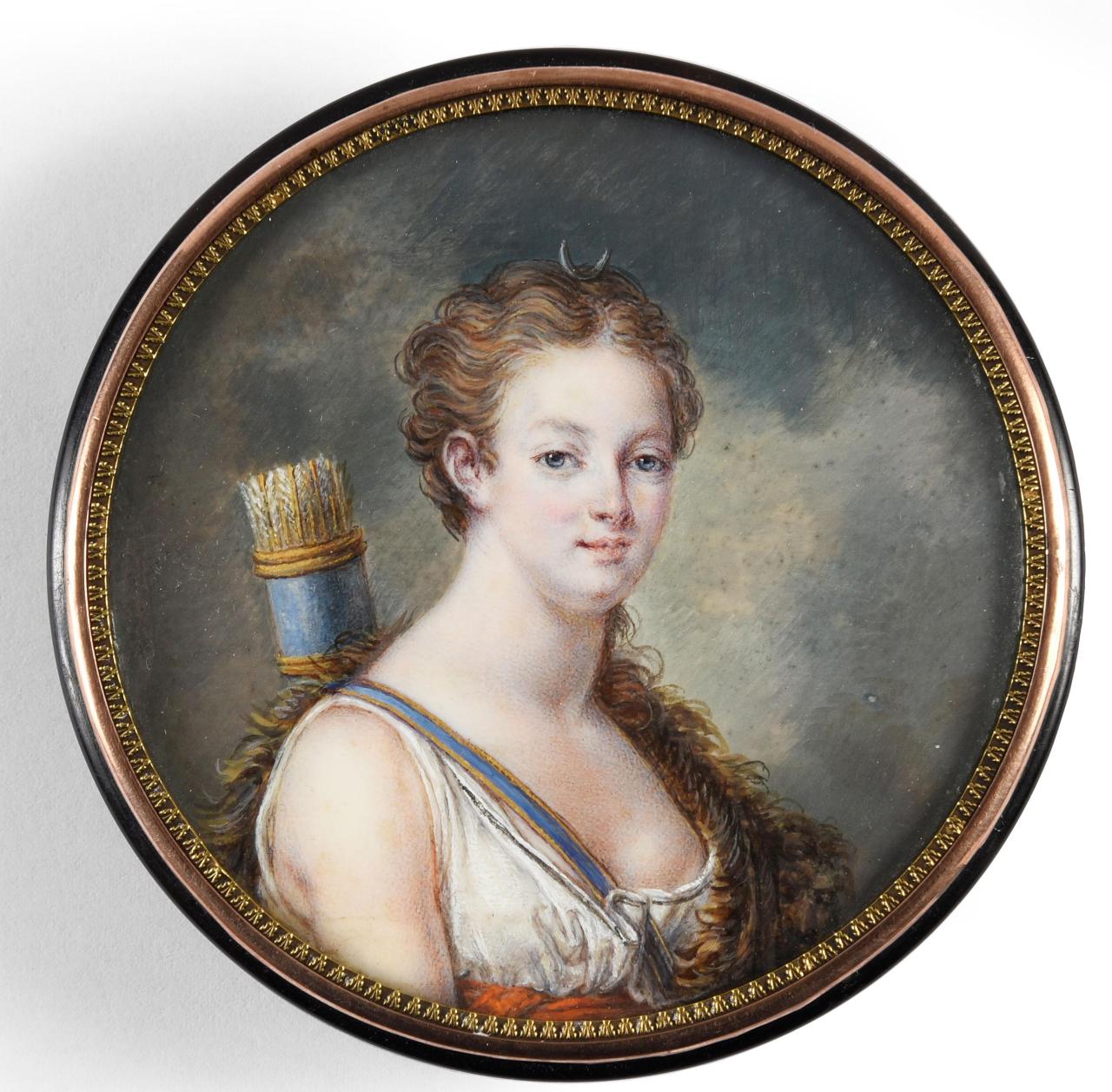 |
| Marie-Antoinette as the Virgin goddess of the Hunt |
The PBS Marie Antoinette is the typical British propaganda about French royals being sex-crazed and decadent. But the ridiculous notion about it being a "feminist" interpretation is anachronistic, showing a complete misunderstanding of the historical role of women. From What to Watch:
Perhaps not surprisingly, since she takes the title role in the historical drama, Marie Antoinette, Emilia Schüle has a different opinion from most on the much-maligned last Queen of France.
"Marie Antoinette is framed in this one very particular way, but there was so much more to it," says the German actor. "Having played her, I think she’s a very inspiring, even feminist, human being who was fighting for her personal freedom and for her family." As the 18th-century period drama returns for Marie Antoinette season 2, Marie and her husband, King Louis XVI (Louis Cunningham) are in the Palace of Versailles and at the height of their power and popularity. (Read more.)
There actually were "feminists" around in Marie-Antoinette's lifetime, such as Mary Wollstonecraft, who did not see Marie-Antoinette as one of her number at all. Mary Wollstonecraft, called the "Mother of Feminism," saw the Revolution as the dawn of a glorious new era, as she describes in an excerpt from her book An Historical and Moral View of the Origin and Progress of the French Revolution; and the Effect it Has Produced in Europe. When the book was published in 1795, thousands of people had already been killed; the genocide in the Vendée, including the torture, rape and murder of women and children, was at its height.
Yet Mary Wollstonecraft dismisses the mass murders and extreme violence to be merely the result of "the
desperate and engaged factions." Otherwise, she lauds the "grand
theatre of political changes" which were leading France "from a state of
barbarism to that of polished society...hastening the overthrow of the
tremendous empire of superstition and hypocrisy, erected upon the ruins
of gothic brutality and ignorance." (I have no doubt that by "empire of
superstition and hypocrisy" she was referring to the Catholic Church.)
She rejoices that the French were at last to "grasp the sentiments of
freedom" while being delivered from the "servility and voluptuousness"
of the ancien régime.
Mary Wollstonecraft, unfortunately, was not herself unfamiliar with
"voluptuousness and servility," as she later became as famous for her
stormy love affairs as for her writings. Why certain women turn to
feminism has always interested me; Mary's case is especially sad. Mary
was the brilliant and sensitive daughter of an abusive and improvident
father; she had to protect her mother and sisters from beatings and
heaven knows what else. She later became involved with men who used her
then abandoned her, contributing to her struggle with depression and
suicidal tendencies.
Mary criticized Edmund Burke's lament for the death of Marie-Antoinette
and the end of chivalry; she hated chivalry and thought that women
should be able to take care of themselves. Poor Mary, however, could
barely support herself and the child she had by one of her lovers.
Finally, she found a man who loved her, William Godwin, and they
married; their happiness was short-lived. She died as so many other
woman died in those days, from complications in childbirth.
Nevertheless, before her death she found great satisfaction in her
motherly roles that she may not have found in other areas of her life.
The child she brought into the world amid such great suffering became
the gifted writer Mary Shelley, author of Frankenstein and wife of Percy Bysshe Shelley. All of which, of course, is a story in itself....
As for Marie-Antoinette, to the horror of feminists everywhere, she was taught to be obedient to the men in her life, beginning with her husband's grandfather Louis XV and secondly to her husband Louis XVI. She disobeyed only when she thought the law of God was being compromised, as when as a fifteen-year-old dauphine she refused to speak to the king's mistress Madame du Barry. Later, she refused to accept as a confessor any priest who had denied the papal supremacy. At her trial she declared that she was merely the wife of Louis XVI, and had been bound to conform to his will. It was the way she had been brought up, as were all women and girls just about everywhere. This does not mean she was not high-spirited and mischievous, but everything she did was done with her husband's permission. The idea of herself making decisions on her own would have been seen by her, as by most women of her day, as being unwomanly. Marie-Antoinette was not a great intellect like Mary Wollstonecraft or Catherine II or Madame de Staël. She read Rousseau but other than him she enjoyed novels, plays, histories and prayer books. While she believed in the reform of family life, with women taking care of their own children instead of farming them out to wet nurses, and had a great many charities to aid mothers and their children, she was in no way what anyone then or now would regard as a feminist.

















No comments:
Post a Comment